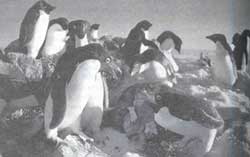The blood runs cold
 HAVE you ever thought what prevents aquatic organisms living in and around the icy continent of Antarctica from freezing? Researchers believe that an enzyme -- lactate dehydrogenase (LDH) -- plays an important role in keeping these organisms metabolically active, and helps them survive even at sub-zero temperatures.
HAVE you ever thought what prevents aquatic organisms living in and around the icy continent of Antarctica from freezing? Researchers believe that an enzyme -- lactate dehydrogenase (LDH) -- plays an important role in keeping these organisms metabolically active, and helps them survive even at sub-zero temperatures.
S Shivaji, a scientist from the Hyderabad-based Centre for Cellular and Molecular Biology (CCMB), claims to have deciphered the genetic code of LDH from an Antarctic fish, which could contribute significantly in understanding the molecular basis of their adaptation at such low temperatures. This enzyme was studied by him during his recent visit to the icy continent.
All tropical organisms, explains S Shivaji, have enzymes that function optimally at 37 degrees C, and exhibit little or no activity below 5 degree C. Hence, logically, it could be assumed that enzymes in organisms living in the Antarctica would function optimally at low temperatures.
The enzyme LDH, according to Shivaji, is present in a wide variety of animals including fishes. Its activity seems to be dependent on the "growth temperature", that is, ldh from a fish from the tropical waters or from a desert lizard are known to be highly active at 30 degree C. But the same enzyme from an Antarctic fish exhibits an optimal activity at 5 degree C, or even less, and is inactivated at temperatures nearing 50 degree C.
"Although the LDH enzyme had been purified from other sources earlier, its sequence had not been easy to assess," says Shivaji. Studies related to the detailed structure of the enzyme would shed light on the adaptive properties of such cold-active enzymes. "Such studies, apart from providing basic information on the survival of lifeforms in extreme environmental conditions, may also lead to applications useful for the human society," he adds.
